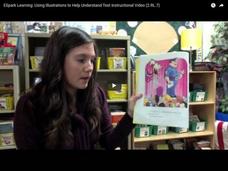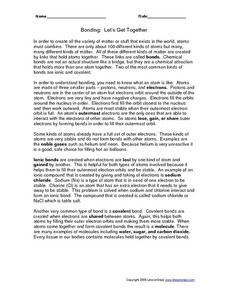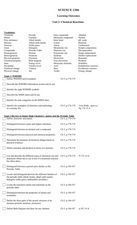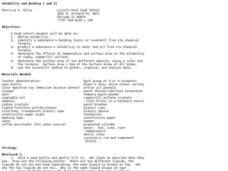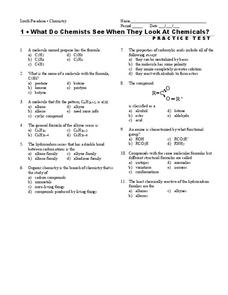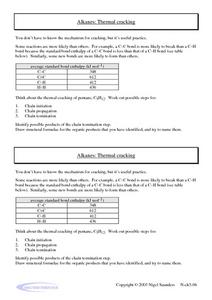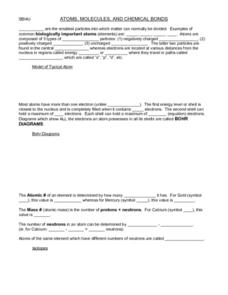Museum of Science
goREACT
Beginning Boyles and curious Curies can safely experiment with the virtual mixing of elements using this entertaining application.
Virginia Department of Education
The Effects of Heat and Acid on the Enzyme Catalase
How quickly do enzymatic reactions occur? Assist the class as they examine heat and pH change to determine the rate of chemical reactions using catalase as an enzyme. Watch them "glow" with excitement!
Curated OER
Bonding: Let's Get Together
In this atom instructional activity, students read 5 paragraphs about ionic bonds. Students answer 2 true/false questions, 4 fill in the blank, 3 multiple choice, and 1 short answer question.
Virginia Department of Education
The Law of Conservation of Matter
The Law of Conservation of Matter can be complex for young scientists to fully grasp. Use this experiment to help simplify the process as pupils perform two experiments to determine mass: one that melts a substance and the other that...
Pingry School
Comparing Activities of Selected Metals
Don't overreact! A simple experiment demonstrates chemical reactions as scholars mix chemical solutions and metals in a large well plate. They note all changes to the metals, solutions, precipitate, colors, and more. A full data table...
It's About Time
Organic Substances
Host an exciting lab in which learners burn fruit rinds to better understand hydrocarbons. A reading passage and analysis questions wrap up the lesson.
National Institute of Open Schooling
p-Block Elements and Their Compounds – II
Ozone, made of three bonded oxygen atoms, is found 15-30 km above Earth, has a strong smell, is blue, and blocks sunlight from hitting the surface of Earth. The 22nd lesson in a series of 36 specifically focuses on the important elements...
Curated OER
Learning Outcomes
In this science worksheet, learners explore the learning outcomes for a unit on chemical reactions. Students define 60 vocabulary words and answer a list of questions for each topic.
Curated OER
Chemical Bonding
Eighth graders identify the three main types of chemical bonds. In this chemistry instructional activity, 8th graders draw Lewis dot diagrams of elements and determine the bond formed. They create a model water molecule.
Curated OER
Matter and Chemical Bonding
For this chemical bonding worksheet, students read about the invisible killer, dihydrogen monoxide. Students read about the products it is used in and the problems it causes to the environment. Then students complete 19 short answer...
Curated OER
Classifying Chemical Reactions
In this chemical reactions learning exercise, students learn about the 5 types of chemical reactions as well as endothermic and exothermic reactions. Students are given 5 equations to balance and they identify the type of reaction for...
Curated OER
Classifying Chemical Reactions
In this chemical reactions worksheet, learners follow a flow chart to determine what type of reaction is occurring. Students then classify reactions and balance the equations. This worksheet has 2 short answer and 10 fill in the blank.
Curated OER
Ionic and Covalent Bonds
Ionic and covalent bonds are the focus of this chemistry activity, which provides learners with eighteen key terms to use in a fill-in-the-blank activity. Additionally, students are prompted to write the number of atoms in four given...
Virginia Department of Education
Mystery Iron Ions
Young chemists perform an experiment to determine if a compound is iron (II) chloride or iron (III) chloride. Then they determine the formula, balance the equation, and answer analysis questions.
Curated OER
The Absorption of Solar Energy
Two sequential parts to this lesson introduce your class to the electromagnetic spectrum, the ability to absorb radiant energy, and the pigments in leaves that are responsible for collecting sunlight to be used in the photosynthetic...
Curated OER
Elements and Bonding Worksheet
In this elements and bonding worksheet, students classify given elements, they identify valence electrons in atoms, they explain the reactivity of elements, and they explain why certain atoms gain electrons while others lose electrons.
Curated OER
The Effects of Temperature on Chemical Mixtures
Students explore chemical cahnges and the effect of temperature on chemical mixturees, They make observations of the behavior and appearance of certain chemical mixtures and reactions.
Curated OER
Ionic Chemical Formulas Days 1 & 2
Students study polyatomic ions and write binary and ternary ionic chemical formulas. They explore putting together different monatomic ions and coming up with as many chemical formulas as possible. They play a game similar to memory...
Curated OER
What do Chemists See When they Look at Chemicals?
In this chemicals worksheet, students answer 15 multiple choice questions about chemicals, compounds, inorganic and organic molecules.
Curated OER
Alkanes: Thermal Cracking
For this alkanes worksheet, students compare the average standard bond enthalpy for common bonds. Then students complete 3 short answer questions.
Curated OER
Yeast Fermentation
Students measure the temperature change involved in the production of carbon dioxide by yeast. They also identify products and reactants in a chemical and balance the equation.
Curated OER
Atoms, Molecules, and Chemical Bonds
In this atoms worksheet, students review the parts of an atom, Bohr diagram, atomic number, mass number, and covalent bonds. This worksheet has 5 drawings and 26 fill in the blank questions.
Cornell University
Radical Reactions
The radical reactions of polymers seems abstract to many pupils, but this lesson turns them into a fun building game. Scholars use dice and building pieces to build polymers. Then, they determine the theoretical and experimental weight...


